Chances are, if you are a teacher {in the classroom or at home}, you aren’t rolling in the dough. I know. Complete shocker. Budget cuts for classroom teachers often mean less teaching supplies provided. And many times, homeschoolers teach on one income.
My goal today is to share some teaching supplies you can use on a tight budget that really can pack a punch with teaching, especially literacy and math. I also am going to share a few teaching supplies that I did purchase towards the bottom, but we use them all.the.time.
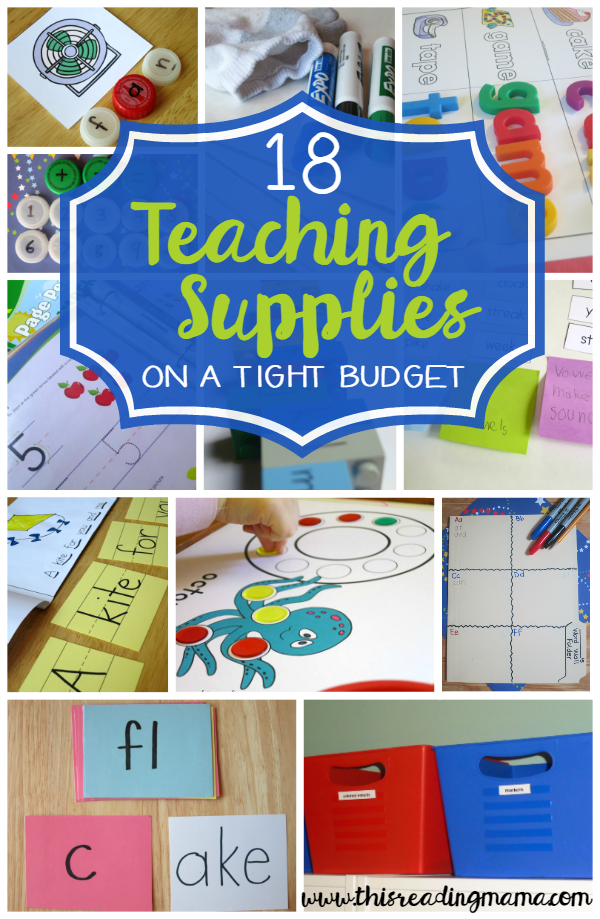
*This post contains affiliate links.
18 Teaching Supplies on a Tight Budget
1. One of my favorite supplies is bottle caps. Yes, bottle caps. Even if you don’t drink soda or bottled water, I bet you know people who do. Ask for them to collect the caps for you.
Add letters for kids to spell words.
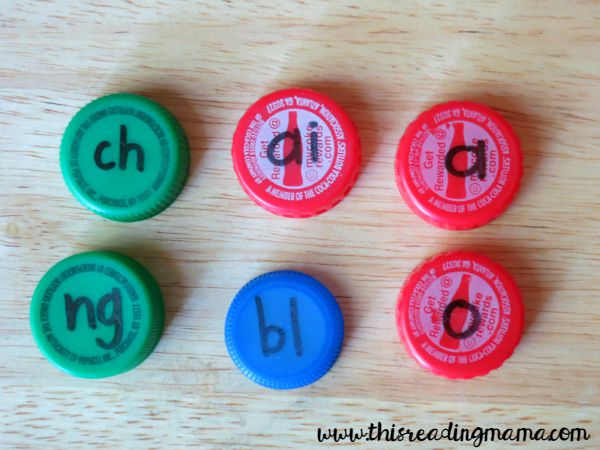
You can even write more complicated phonics sounds on the caps, similar to the letter tiles from All About Spelling.
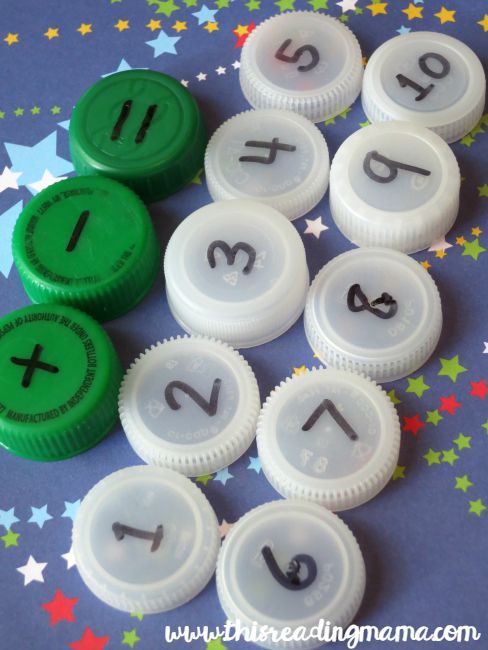
Or add numbers for some math work. So simple!
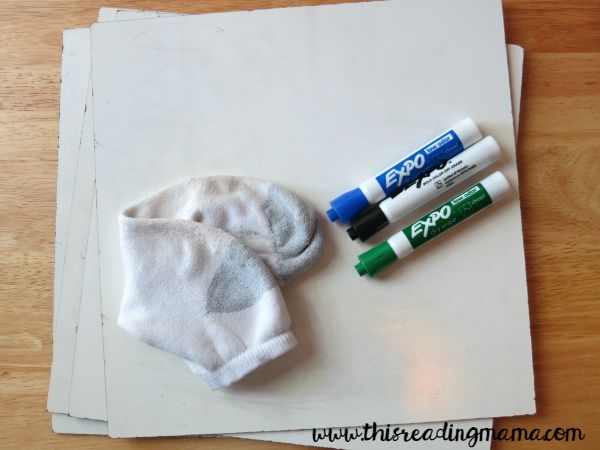
2. Instead of buying expensive dry erase boards for you kids, go to a local hardware store and ask for a large sheet of shower board. The larger hardware store chains may even cut your shower board down for you right there in the store. I had mine cut into 12 x 12 squares with a few extra larger pieces left over. Collect old socks and use them for erasers.
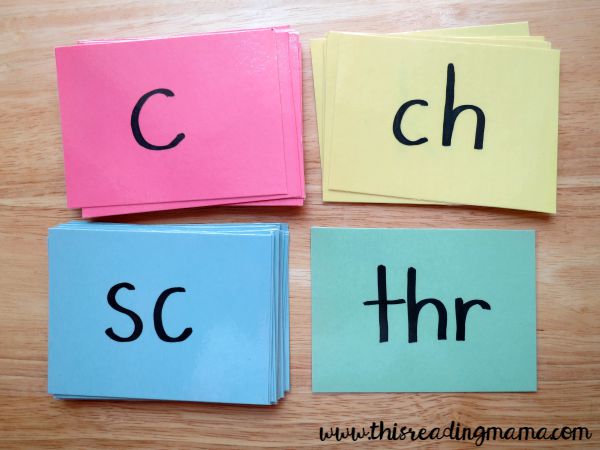
3. Index cards make GREAT pre-cut cards for DIY phonics games or flash cards. These are the onset cards I made. I bought colored index cards when they were on sale and cut them in half. I wrote single consonants on the pink cards, blends on blue cards, digraphs on yellow cards, and more complicated sounds like spr, str, and thr on green.
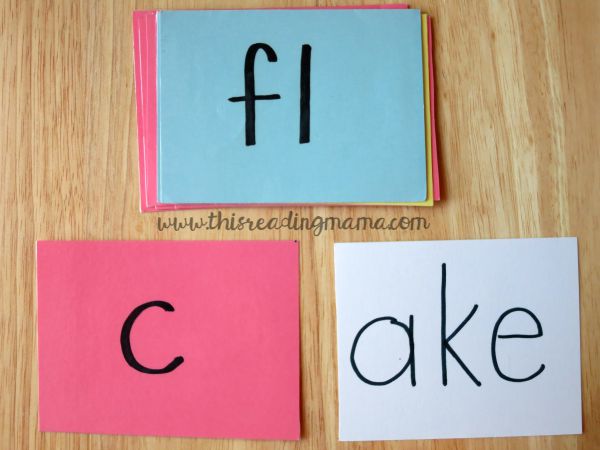
Then, I wrote short and long vowel rimes onto white index cards. These work GREAT for word family work!
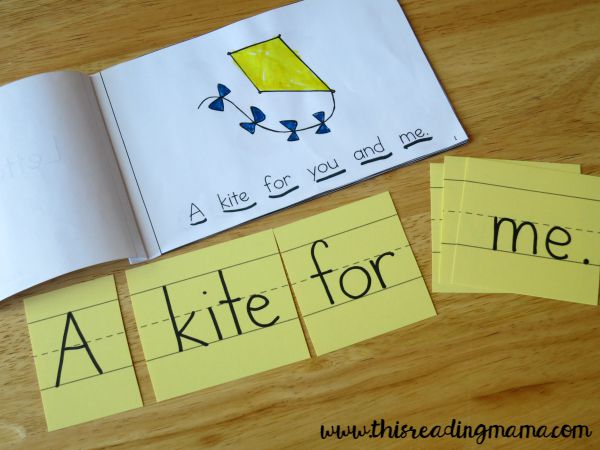
4. Sentence strips make a great tool for breaking sentences apart to rebuild them {book from Reading the Alphabet, letter Kk}. Kids can do this on the floor, table top or in a pocket chart. You can also use them like I mention with the index cards above.
5. If you have tons of LEGO bricks on hand, you can use them as phonics snap cubes or base ten blocks. Follow my simple tutorial for making your own LEGO letters for spelling.
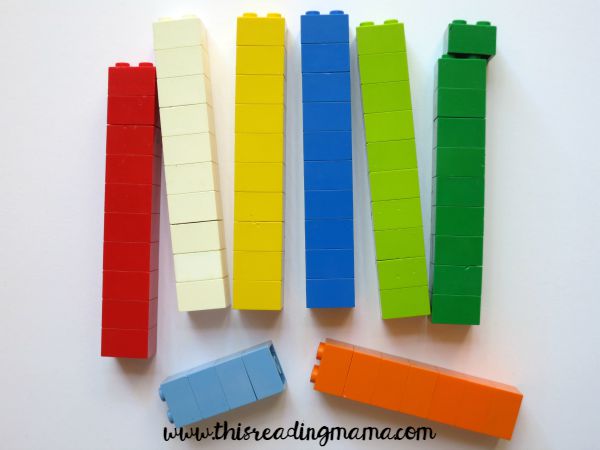
You can also stack 10 of each color of LEGO brick {I use 4×4 size} and use them for math manipulatives, similar to the base ten blocks.
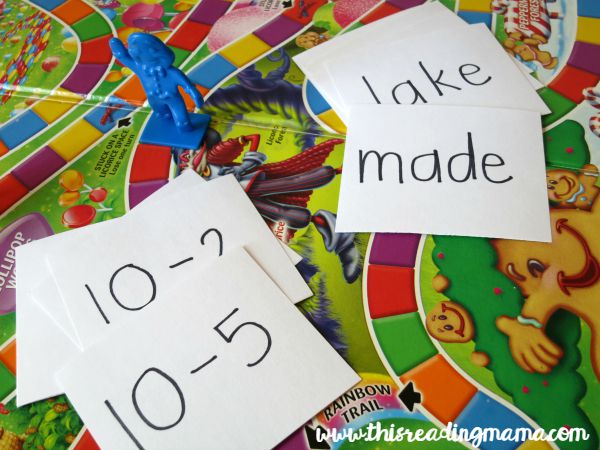
6. Simply add flash cards to board games you already have to make them match any objective you’re teaching. Add math cards or phonics cards to the mix. If you play this with Candy Land, the child has to draw a flash card and answer correctly first, then he can draw the colored card and move.
7. Make your own pointer with craft sticks by gluing a feather or something to the end of it. A bubble wand also makes a great pointer. You can find some that we made for re-reading, some that we just made for fun, and extra pictures you can cut out and use for pointers in all our Pre-K/K Packs.
8. Sticky Notes can be on the expensive, especially if you buy the brand name. But I have also found off-brand ones at the $1 store. We’ve used sticky notes for sight word scavenger hunts, a family fun scavenger hunt, letter writing and phonics, after a word sort, and many more that I haven’t shared on the blog. Plus, kids of all ages love sticky notes, making it a high interest tool for learning.
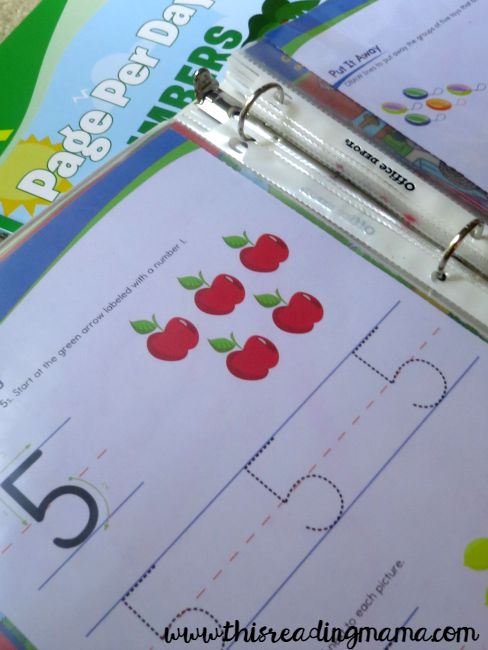
9. Plastic sleeve protectors are not that expensive, even when bought by the 100 pack. Often times, when you’re tempted to laminate something, a plastic sleeve protector will do the trick. Kids can often re-use a worksheet or page over and over again if you use a plastic sleeve protector and a dry erase marker instead of a pencil.
10. Magnetic letters are great because you can find them almost anywhere. My favorite magnetic letters are these. They make for a wonderfully hands-on activity in spelling words. We have FREE beginning sound mats, short vowel building mats, and CVCe building mats that work well with magnetic letters.
11. Magnetic cookie sheets. I recommend getting some at the $1 store for sure!! I bought 4 {one for each of our kids}, but they are a wonderful tool with magnetic letters. We also use Power Magnets with ours, although Power Magnets are more expensive.
12. Most young kids love playdough. Playdough is not expensive to buy. It’s even cheaper to make. Playdough is great for fine motor skills and can be used for all kinds of learning objectives. We have 40+ FREE Playdough Mats you can search through.
13. Use items you already have such as buttons, pennies, or dried beans. This works particularly well for our low-prep phonics games or as math manipulatives to help kids solve problems.
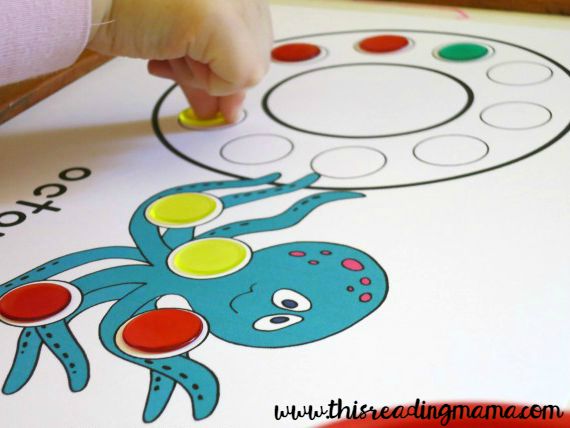
14. Transparent counters are not expensive to buy and also work well as math manipulatives. We use transparent counters quite a bit to make it easier to re-use pages. If you use the dot pages from Learning the Alphabet, instead of dotting with the Do-a-Dot paint, you can use transparent counters. Then the pages can be used over and over again, saving you money in the long run.
15. Manila folders are not very expensive for a large pack and can be used for file folder games, word wall folders, writing folders, among lots of other ideas. As a classroom teacher, I overlapped two, stapled them together, and set them up around kids when I was assessing them to help kids keep eyes on their own work.
16. Love me some bins from $1 store. Seriously. Almost any time of year you go, you can usually find unique containers and bins that can be used for so many things in the classroom. Our homeschool room is filled with them!
17. Re-use packaging from food or containers for learning. Washed out mayonnaise jars and peanut butter jars are a great way to transport scissors and glue sticks. I especially like the see-through containers because I can see what’s in them right away!
18. The public library. Yes, it’s kind of an obvious answer, but often overlooked. We go once a week and check out books as well as learning DVD’s.
19. Yes, I know the title says, “18 Teaching Supplies,” but I couldn’t let a money saving post go by without mentioning ALL our free printables. We have TONS of them for Pre-K-2…with even more coming for older learners, too!!
Teaching Supplies Worth the Purchase
These teaching supplies are a little more on the expensive side, but totally worth the purchase.
- Scotch laminator and Scotch pockets– Things that you make can be made durable and reusable, saving you time and money in the long run.
- Differentiated Cubes– We have the Photo Stacking Blocks, but I’ve also heard great reviews about Carson-Dellosa’s differentiated cubes {which cost less}
- Do-a-Dot Paint Markers– The paint lasts quite a while and we use ours A LOT.
- Pocket Charts- The two we have and use are the standard pocket chart and the tabletop pocket chart.
- Alphabet Stamps- My favorite are the Melissa & Doug stamps.
- Lap Desks– While you can buy cheap ones at a craft store, they don’t store materials inside AND fold up for EASY storage!
You Might Also Like:
30+ Homeschool Hacks
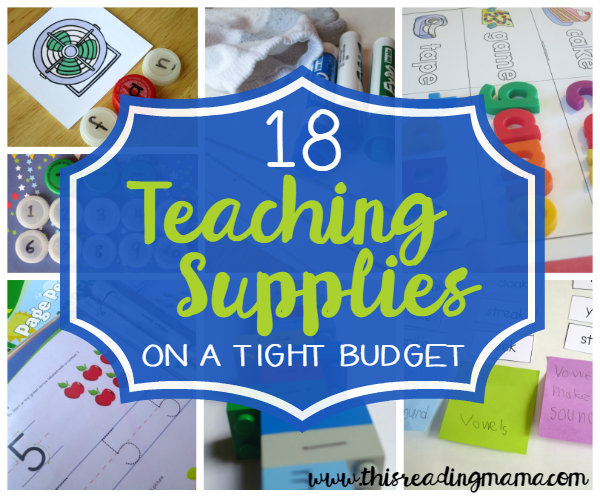
Stay connected to This Reading Mama so you don’t miss a thing:
- Subscribe by email {get really cool FREEBIES when you do!}
- Google+
~Becky
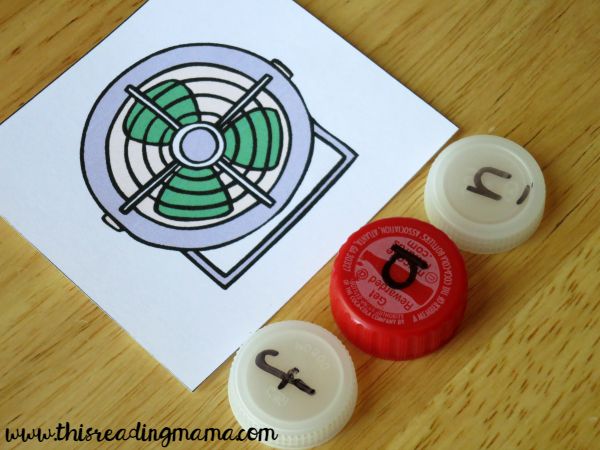
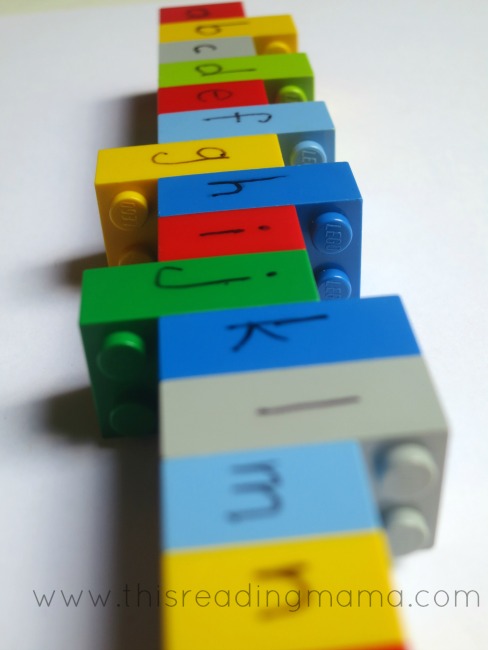
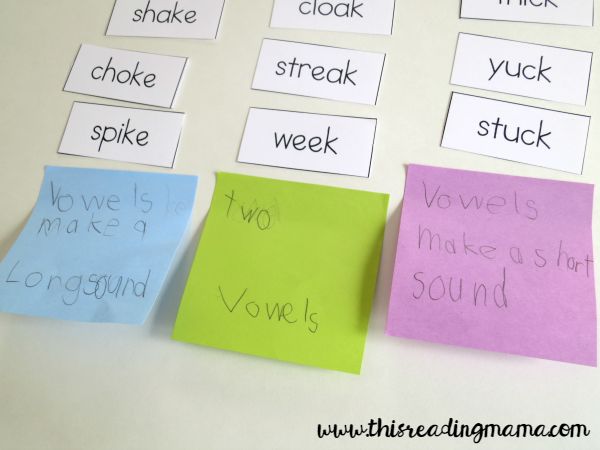
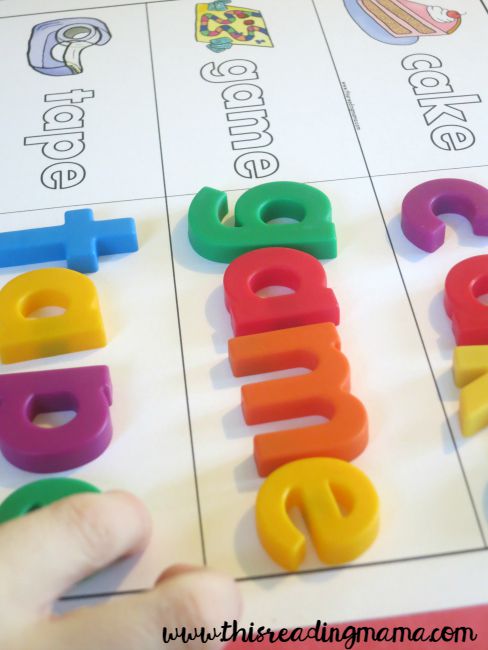
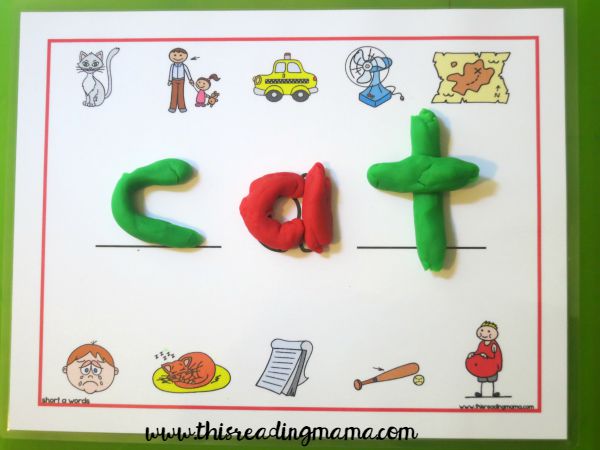
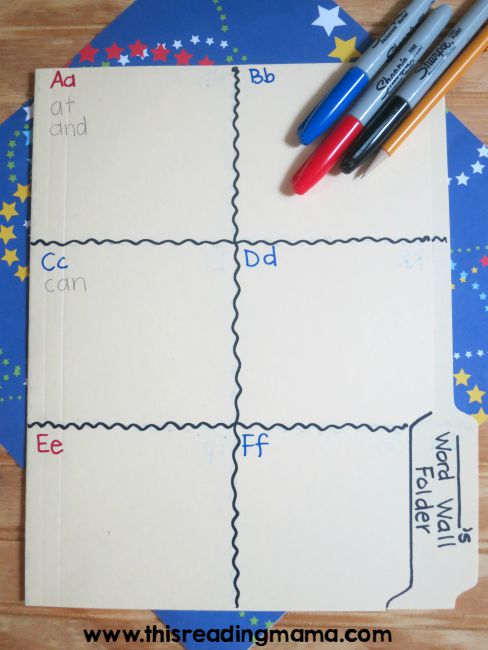
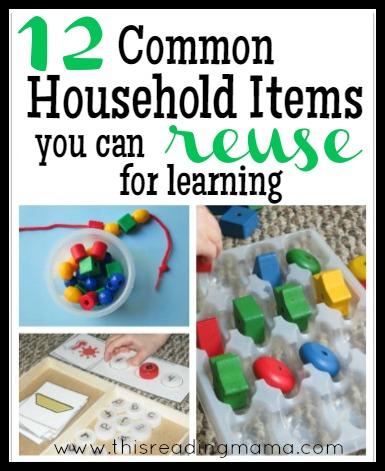

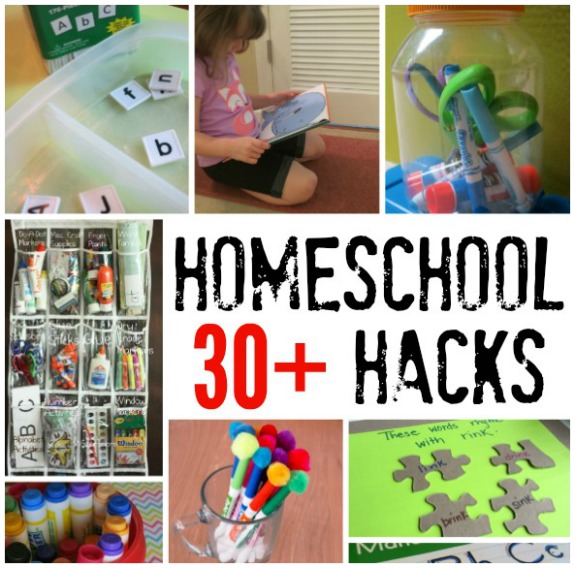
What a great list! Grandma washes and saves plenty of random sized containers for us. They’re great for so many things!
That’s awesome! It’s nice to have a grandma who does things like that. 🙂
Dollar Tree now sells a do-a-dot style marker, 2 in a pack!
That’s good to know!